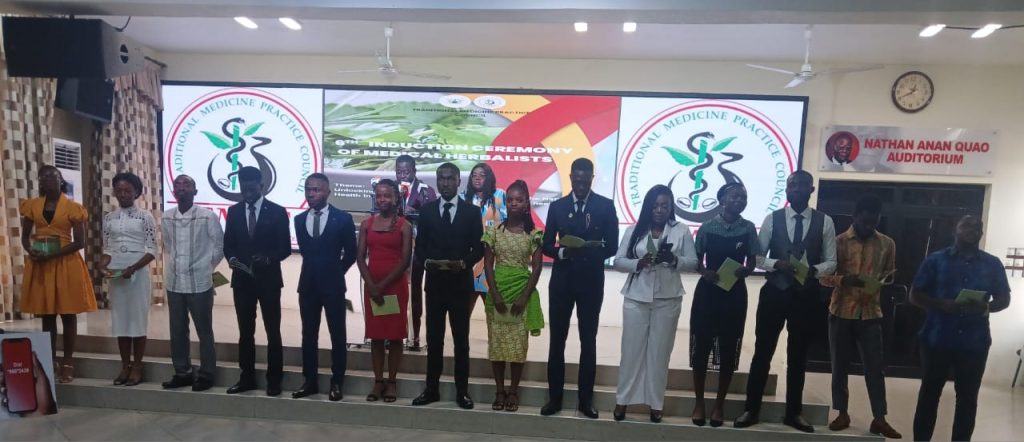By Muniratu Akweley Issah / Rebecca Som
Accra, Nov 01, GNA- The Traditional Medicine Practice Council (TMPC) has inducted 16 newly qualified Medical Herbalists into the Council in Accra on Wednesday.
The inductees were students, who had successfully completed their six years of study in Traditional Medicine Practice at the Kwame Nkrumah University of Science and Technology (KNUST).
The 2021 batch of newly qualified Medical Herbalists would be posted to render their services at the various government hospitals, where herbal medicine had been integrated into the mainstream healthcare delivery.
The sixth induction ceremony of Medical Herbalists was on the theme: Unlocking the potential of herbal medicine in the National Health Insurance Scheme (NHIS) for inclusive holistic healthcare”
Dr. Michael Kyeremateng, the Registrar, TMPC said there was the need for supportive policies and regulations that would facilitate the integration of herbal medicine into the national healthcare system.
The Registrar said sectoral synergy would also help to bridge the gaps between academia, research, policy and practice to create a cohesive approach to healthcare involving patients, families and communities in the pursuit of inclusive, quality patient-centred care.
He said: “Your presence represents interprofessional collaboration, bringing together medical herbalists, medical practitioners, medical allopaths or orthodox practitioners, indigenous practitioners, to foster mutual understanding and respect.”
Dr Sandra Ashong, President, Ghana Association of Medical Herbalists (GAMH) said herbal medicine services had seen significant improvement and advancement in the various government hospitals in the country.

“Now more people are becoming aware that we run herbal medicine services at the government hospitals, so we are urging the public to seek treatment from certified medical herbal practitioners at the government hospitals and ensure quality healthcare services,” she added.
She called on the government to expedite the roll out of the herbal medicine treatment under the NHIS to save out of pocket payment among clients.
She said since herbal medicine service was integrated in some 55 government hospitals, most of the medicines were not covered by the scheme and most patients are unable to do out of pocket payment, which had been a concern for many.
“We are very glad and hopeful that the roll out will start as soon as possible to help increase hospital attendance and enable more Ghanaians to patronise herbal medicines at the facility,” she added.
She expressed concern as most of their members have not been posted since 2019 and beyond, urging the government to seek financial clearance for their members to be employed.
“It is very pathetic, as President of the Association, sometimes I have sleepless nights receiving calls from our members who have not been employed since 2019,” she said.
She pleaded with the government to get them financial clearance so that their members, who have been at home for the past five years would start working as soon as possible.
Dr Anastasia Yirenkye, Director, Traditional and Alternative Medicine Directorate (TAMD), Ministry of Health said the government had made significant progress in developing traditional medicine as a viable healthcare option over the last 20 years.
She said the inequality suffered by the Ghanaian especially the deprived and underserved communities had been a matter of great concern, adding that the government was trying to address such inequalities within the limited resources
Dr Yirenkyi said addressing the inequalities was the surest way to achieve the Sustainable Development Goal 3, thus achieving health for all at all ages and hopeful that the minister would make the herbal medicine under the NHIS a reality.
GNA